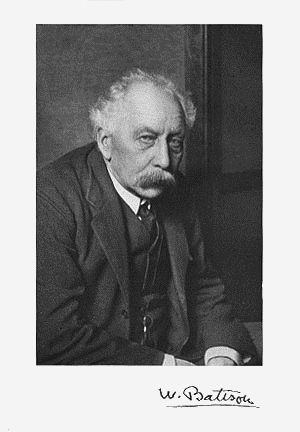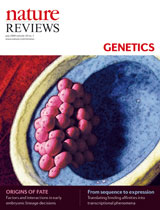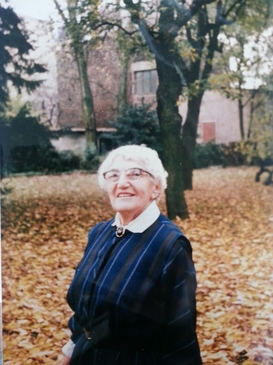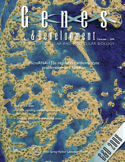
John Burdon Sanderson Haldane, nicknamed "Jack" or "JBS", was a British-Indian scientist who worked in physiology, genetics, evolutionary biology, and mathematics. With innovative use of statistics in biology, he was one of the founders of neo-Darwinism. He served in the Great War, and obtained the rank of captain. Despite his lack of an academic degree in the field, he taught biology at the University of Cambridge, the Royal Institution, and University College London. Renouncing his British citizenship, he became an Indian citizen in 1961 and worked at the Indian Statistical Institute for the rest of his life.

William Bateson was an English biologist who was the first person to use the term genetics to describe the study of heredity, and the chief populariser of the ideas of Gregor Mendel following their rediscovery in 1900 by Hugo de Vries and Carl Correns. His 1894 book Materials for the Study of Variation was one of the earliest formulations of the new approach to genetics.

Mary Frances Lyon was an English geneticist best known for her discovery of X-chromosome inactivation, an important biological phenomenon.
Alfred Henry Sturtevant was an American geneticist. Sturtevant constructed the first genetic map of a chromosome in 1911. Throughout his career he worked on the organism Drosophila melanogaster with Thomas Hunt Morgan. By watching the development of flies in which the earliest cell division produced two different genomes, he measured the embryonic distance between organs in a unit which is called the sturt in his honor. On February 13, 1968, Sturtevant received the 1967 National Medal of Science from President Lyndon B. Johnson.
Deborah Charlesworth is a population geneticist from the UK, notable for her important discoveries in population genetics and evolutionary biology. Her most notable research is in understanding the evolution of recombination, sex chromosomes and mating system for plants.

Nature Reviews Genetics is a monthly review journal published by Nature Portfolio. It was established in 2000 and covers the full breadth of modern genetics. The editor-in-chief is Linda Koch. The journal publishes review and perspective articles written by experts in the field subject to peer review and copy editing to provide authoritative coverage of topics. Each issue also contains Research Highlight articles – short summaries written by the editors that describe recent research papers.

Charlotte "Lotte" Auerbach FRS FRSE was a German geneticist who contributed to founding the science of mutagenesis. She became well known after 1942 when she discovered with A. J. Clark and J. M. Robson that mustard gas could cause mutations in fruit flies. She wrote 91 scientific papers, and was a Fellow of the Royal Society of Edinburgh and of the Royal Society of London.

The American Journal of Human Genetics is a monthly peer-reviewed scientific journal in the field of human genetics. It was established in 1948 by the American Society of Human Genetics and covers all aspects of heredity in humans, including the application of genetics in medicine and public policy, as well as the related areas of molecular and cell biology. According to the Journal Citation Reports, the journal has a 2019 impact factor of 10.502. The journal is published by Cell Press an imprint of Elsevier. Bruce R. Korf became the editor-in-chief in the winter of 2017–2018.
Genes, Brain and Behavior is a peer-reviewed online-only scientific journal covering research in the fields of behavioral, neural, and psychiatric genetics. It is published by Wiley-Blackwell on behalf of the International Behavioural and Neural Genetics Society. The journal was established in 2002 as a quarterly and is currently published monthly. G2B is a hybrid open access journal, but two years after publication all content is available for free online.

The Annual Review of Genetics is an annual peer-reviewed scientific review journal published by Annual Reviews. It was established in 1967 and covers all topics related to the genetics of viruses, bacteria, fungi, plants, and animals, including humans. The current editor is Tatjana Piotrowski. As of 2021, Journal Citation Reports gives the journal a 2020 impact factor of 16.830, ranking it fourth out of 175 journals in the category "Genetics & Heredity".

Nature Genetics is a peer-reviewed scientific journal published by Nature Portfolio. It was established in 1992. It covers research in genetics. The chief editor is Tiago Faial.

Genes & Development is a peer-reviewed scientific journal covering molecular biology, molecular genetics, cell biology, and development. It was established in 1987 and is published twice monthly by Cold Spring Harbor Laboratory Press in association with The Genetics Society.
Current Gene Therapy is a peer-reviewed medical journal published by Bentham Science Publishers. The editor-in-chief is Liang Cheng. The focus of this journal is pre-clinical or clinical research on gene therapy. Formats of publication include original research reports, review papers, and rapid communications ("letters").

Genesis: The Journal of Genetics and Development is a peer-reviewed scientific journal of genetics and developmental biology. It was established as Developmental Genetics in 1979 and obtained its current title in 2000. In addition to original research articles, the journal also publishes letters to the editor and technology reports relevant to the understanding of the functions of genes. The editor-in-chief is Sally A. Moody.
Leslie Clarence Dunn was a developmental geneticist at Columbia University. His early work with the mouse T-locus and established ideas of gene interaction, fertility factors, and allelic distribution. Later work with other model organisms continued to contribute to developmental genetics. Dunn was also an activist, helping fellow scientists seek asylum during World War II, and a critic of eugenics movements.

The Ronald Fisher bibliography contains the works published by the English statistician and biologist Ronald Fisher (1890–1962).

Florence Margaret Durham was a British geneticist at Cambridge in the early 1900s and an advocate of the theory of Mendelian inheritance, at a time when it was still controversial. She was part of an informal school of genetics at Cambridge led by her brother-in-law William Bateson. Her work on the heredity of coat colours in mice and canaries helped to support and extend Mendel's law of heredity. It is also one of the first examples of epistasis.

Epigenomics is a peer-reviewed medical journal established in 2009 and published by Future Medicine. The editors-in-chief are James G. Herman and Jörg Tost. The journal covers all aspects of research on epigenomics and epigenetics and their implications for diagnosis, prognosis and therapeutics.

Steve David Macleod Brown is director of the Medical Research Council (MRC) Mammalian Genetics Unit, MRC Harwell at Harwell Science and Innovation Campus, Oxfordshire, a research centre on mouse genetics. In addition, he leads the Genetics and Pathobiology of Deafness research group.

Genes & Immunity is a peer-reviewed scientific journal covering the intersection between immunology and genetics. It was established in 1999 and is published eight times per year by Springer Nature. The editors-in-chief are Thomas Brunner and Marie-Lise Gougeon. According to the Journal Citation Reports, the journal has a 2021 impact factor of 4.248, ranking it 90th out of 161 journals in the category "Immunology" and 65th out of 175 in the category "Genetics & Heredity".














